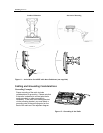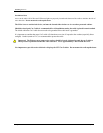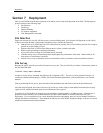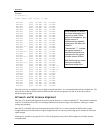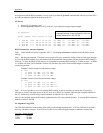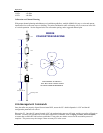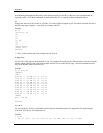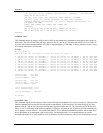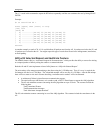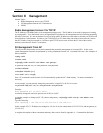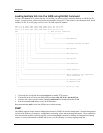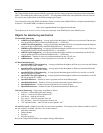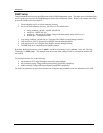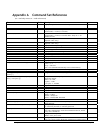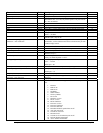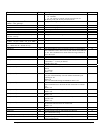
Management
Trango Broadband Wireless — User Manual M900S Rev C
Page
38
The “r” is used in this command to repeat the RF link test repeatedly until the user terminates the test by hitting SPACE
ENTER.
Example:
#> su testrflink 88 r
Press [space] then [enter] to stop
[len] 1512
[suid] 88
[ 0] ...........[AP Tx] 20 [AP Rx] 20 [SU Rx] 20
[ 1] ...........[AP Tx] 20 [AP Rx] 20 [SU Rx] 20
[ 2] ...........[AP Tx] 20 [AP Rx] 20 [SU Rx] 20
[ 3] ...........[AP Tx] 20 [AP Rx] 20 [SU Rx] 20
[ 4] ...........[AP Tx] 20 [AP Rx] 20 [SU Rx] 20
[ 5] ...........[AP Tx] 20 [AP Rx] 20 [SU Rx] 20
Success.
As another example, a result of 20..10..18 would indicate 20 packets sent from the AP, 18 packets received at the SU, and
10 packets received back at the AP. You might expect this type of results from Fresnel zone infringements, interference,
or multi-pathing.
ARQ with Selected Repeat and Multirate Feature
The M900S features ARQ or “Automatic Request for Re-transmission,” which provides the ability to correct for missing
or corrupted packets of data by asking the sender to re-transmit the data.
Both the AP and SU units implement a form of ARQ known as “ARQ with Selected Repeat.”
The units makes a first attempt at transmitting a data frame using the 3.250 Mbps rate. Then, if a re-try is required, the
2nd attempt will also be at 3.250 Mbps. The 3rd and 4th attempts will be at a rate of 1.625 Mbps. After the 4th attempt
there will be no more re-tries and a counter describing “maximum retries reached” will be incremented.
• A minimum of 100ms is placed between re-transmission requests.
• The units buffer up to 600 frames, or 4 seconds worth, of RF TX Data frames to support the ARQ algorithm.
• The AP unit maintains counters concerning the ARQ algorithm on a per SU basis. The counters include the
following data:
Total Transmitted Frames
Total Retransmission Attempts
Total “Maximum Attempts Reached”
The SU unit maintains counters concerning its use of the ARQ algorithm. The counters include the same data as in the
AP.



